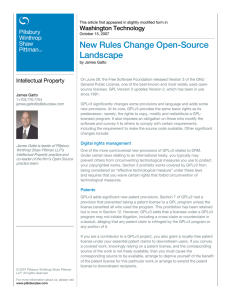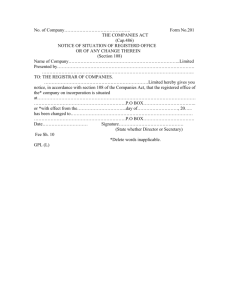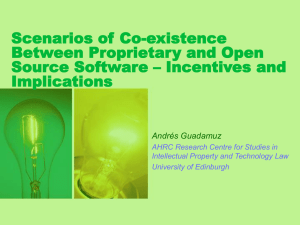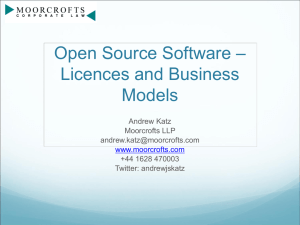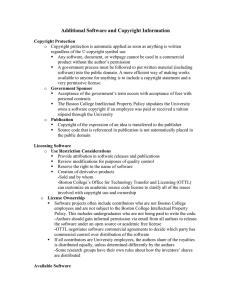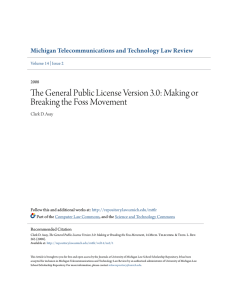GPL Version 3 – Overview of Proposed Changes Developments In Intellectual Property
advertisement
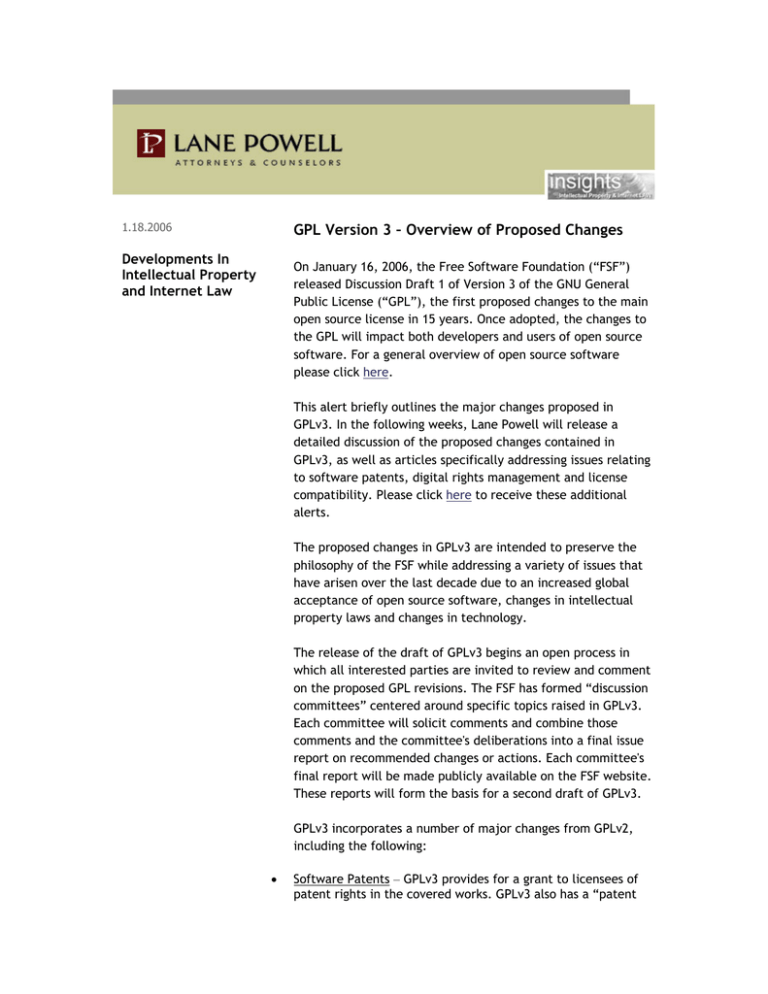
1.18.2006 GPL Version 3 – Overview of Proposed Changes Developments In Intellectual Property and Internet Law On January 16, 2006, the Free Software Foundation (“FSF”) released Discussion Draft 1 of Version 3 of the GNU General Public License (“GPL”), the first proposed changes to the main open source license in 15 years. Once adopted, the changes to the GPL will impact both developers and users of open source software. For a general overview of open source software please click here. This alert briefly outlines the major changes proposed in GPLv3. In the following weeks, Lane Powell will release a detailed discussion of the proposed changes contained in GPLv3, as well as articles specifically addressing issues relating to software patents, digital rights management and license compatibility. Please click here to receive these additional alerts. The proposed changes in GPLv3 are intended to preserve the philosophy of the FSF while addressing a variety of issues that have arisen over the last decade due to an increased global acceptance of open source software, changes in intellectual property laws and changes in technology. The release of the draft of GPLv3 begins an open process in which all interested parties are invited to review and comment on the proposed GPL revisions. The FSF has formed “discussion committees” centered around specific topics raised in GPLv3. Each committee will solicit comments and combine those comments and the committee's deliberations into a final issue report on recommended changes or actions. Each committee's final report will be made publicly available on the FSF website. These reports will form the basis for a second draft of GPLv3. GPLv3 incorporates a number of major changes from GPLv2, including the following: • Software Patents – GPLv3 provides for a grant to licensees of patent rights in the covered works. GPLv3 also has a “patent retaliation” provision, which terminates the licensee’s right to privately modify and run the program if the licensee brings a patent infringement claim against anyone for activities relating to the program or a work based on the program. GPLv3 also provides that the licensor may add additional “patent retaliation” provisions, subject to certain limitations. The patent provisions raise several issues of patent law and patent portfolio management to be addressed in an upcoming Lane Powell alert. • Digital Rights Management (“DRM”) – GPLv3 contains several provisions addressing FSF’s concerns about DRM, including restrictions on the use of covered programs for DRM technology (from copy-protect mechanisms to more sophisticated controls). The license would require that the source code delivered with the covered software also include encryption, authorization and decryption codes. • Derivative Works – GPLv3 addresses questions raised by changes in technology about when a particular work becomes a “work based on a program,” which triggers the provisions of the GPL. GPLv3 also contains a provision clarifying that when independent non-derivative works are distributed for use in combination (including through dynamic linking) with a program covered by the GPL, the entire combination must be licensed under the GPL. • License Compatibility – GPLv3 includes changes intended to provide additional flexibility in combining code from a variety of open source licenses into one program. • Distributions – GPLv3 includes changes and clarifications to the distribution provisions, including changes to the methods by which the source code may be made available. • Additional License Provisions – GPLv3 clarifies that someone who releases a work based on a GPL covered program can add additional terms, including a warranty, so long as the additional terms do not conflict with the terms of the GPL. GPLv3 also provides for a limited set of optional conditions that the licensor may impose. • International Application – GPLv3 contains changes intended to allow for international application of the license without regard to the specific language or requirements of any given country’s intellectual property laws. For more information about GPLv3 or the comment process, please contact the Intellectual Property Practice Group of Lane Powell at: 206.223.7000 Seattle 503.778.2100 Portland iplaw@lanepowell.com www.lanepowell.com We provide this newsletter as a service to our clients, colleagues and friends. It is intended to be a source of general information, not an opinion or legal advice on any specific situation, and does not create an attorney-client relationship with our readers. If you would like more information regarding whether we may assist you in any particular matter, please contact one of our lawyers, using care not to provide us any confidential information until we have notified you in writing that there are no conflicts of interest and that we have agreed to represent you on the specific matter that is the subject of your inquiry. © 2006 Lane Powell PC Seattle - Portland - Anchorage - Olympia - London
